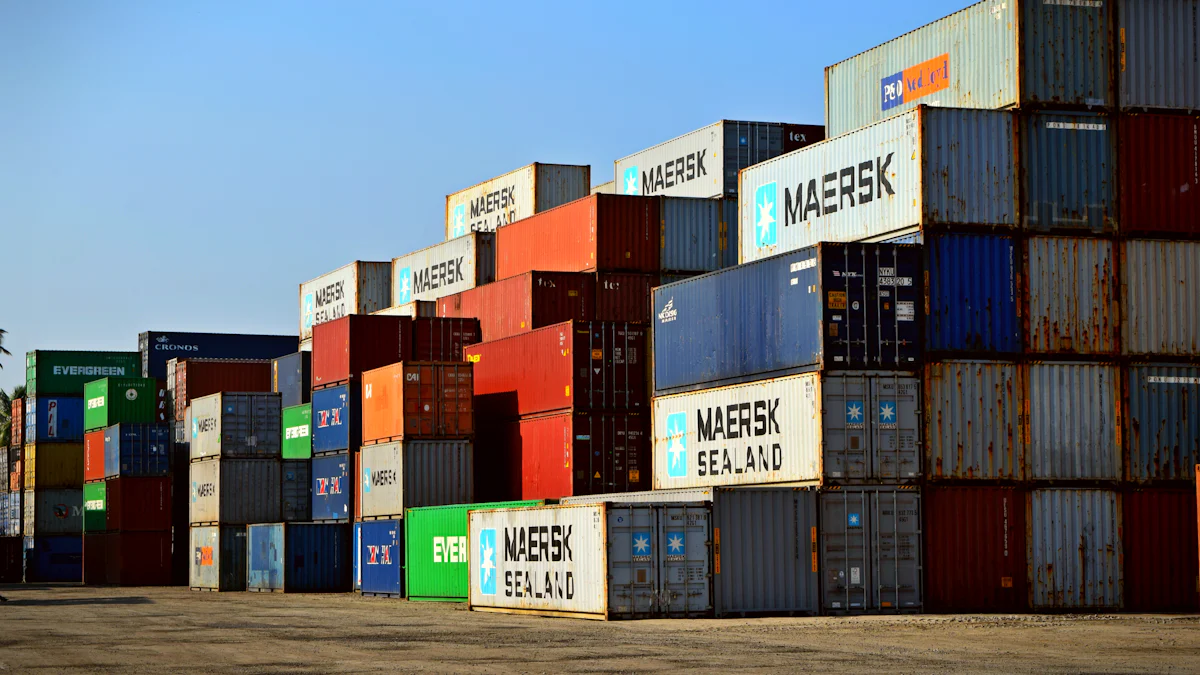Intelligent Supply Chain Innovations Boosting Logistics Performance

Smart supply chain technology uses advanced tools to optimize the flow of goods from suppliers to consumers. Logistics plays a crucial role in this process by ensuring timely and efficient delivery. Technologies like AI, IoT, and blockchain have transformed logistics, making operations more efficient and transparent. For instance, AI-enabled supply chains cut logistics costs by 15% and improve inventory levels by 15%. The global market worth of IoT in supply chain management will reach $41.8 billion by 2033, highlighting its growing importance.
The Role of Smart Supply Chain Technologies

The Role of IoT in Smart Supply Chain
Real-time Tracking and Monitoring
Smart supply chain technology leverages the Internet of Things (IoT) to provide real-time tracking and monitoring. IoT sensors collect data on the location and condition of goods. This data helps companies track shipments and monitor product conditions throughout the supply chain. For example, IoT sensors can detect temperature changes in perishable goods, ensuring quality is maintained. Real-time tracking increases visibility and allows for quick responses to any issues that arise.
Predictive Maintenance
Predictive maintenance is another critical application of IoT in the smart supply chain. IoT devices monitor the health of machinery and equipment. These devices collect data on performance metrics and predict when maintenance is needed. This approach reduces downtime and extends the lifespan of equipment. Companies save money by avoiding unexpected breakdowns and scheduling maintenance during non-peak times. Predictive maintenance ensures that operations run smoothly and efficiently.
Artificial Intelligence and Machine Learning in Smart Supply Chain
Demand Forecasting
Artificial Intelligence (AI) and Machine Learning (ML) play a significant role in demand forecasting within the smart supply chain. AI algorithms analyze historical sales data, market trends, and other factors to predict future demand. Accurate demand forecasting helps companies manage inventory levels and reduce waste. For instance, AI-driven tools can identify patterns and predict seasonal spikes in demand. This capability enables businesses to prepare adequately and meet customer needs.
Route Optimization
Route optimization is another area where AI and ML enhance the smart supply chain. AI analyzes various factors such as traffic patterns, weather conditions, and delivery timelines to determine the most efficient routes. Optimized routes reduce fuel consumption and delivery times. Companies benefit from lower transportation costs and improved customer satisfaction. AI-powered route optimization ensures that deliveries are timely and cost-effective.
Blockchain Technology in Smart Supply Chain
Enhancing Transparency
Blockchain technology enhances transparency in the smart supply chain. Each transaction is recorded on a decentralized ledger, providing an immutable record of the supply chain's history. This transparency helps in verifying the authenticity of products and tracing their origins. For example, blockchain can track the journey of food products from farm to table, ensuring that consumers receive safe and authentic goods. Enhanced transparency builds trust between businesses and customers.
Smart Contracts
Smart contracts are another innovative application of blockchain in the smart supply chain. These self-executing contracts automatically enforce the terms of an agreement when predefined conditions are met. Smart contracts reduce the need for intermediaries and speed up transactions. For instance, a smart contract can release payment to a supplier once goods are delivered and verified. This automation streamlines processes and reduces the risk of fraud.
Robotics and Automation in Smart Supply Chain
Warehouse Automation
Warehouse automation uses robots and automated systems to handle tasks. Robots can pick, pack, and sort items quickly. Automated systems move goods around the warehouse. This technology reduces human error and speeds up operations. For example, Amazon uses robots to transport items to workers. This setup increases efficiency and reduces labor costs.
Automated systems also improve inventory management. Sensors track stock levels in real-time. This data helps companies avoid overstocking or running out of products. Automated warehouses can operate 24/7. This capability ensures that orders are processed quickly. Companies benefit from faster shipping times and happier customers.
Autonomous Vehicles
Autonomous vehicles are transforming logistics. These self-driving trucks and drones deliver goods without human drivers. Autonomous trucks can travel long distances without rest breaks. This feature reduces delivery times and costs. Companies like Tesla are developing electric autonomous trucks. These vehicles promise to cut fuel costs and emissions.
Drones offer another exciting possibility. Drones can deliver packages to remote areas quickly. Companies like Amazon and UPS are testing drone deliveries. Drones can bypass traffic and deliver goods faster. This technology is ideal for last-mile deliveries. Customers receive their orders quickly and conveniently.
Autonomous vehicles also enhance safety. Advanced sensors and AI systems help avoid accidents. These vehicles can operate in various weather conditions. Autonomous technology ensures timely and safe deliveries. The logistics industry stands to gain significantly from these innovations.
Smart supply chain technologies have revolutionized logistics. Key innovations include IoT, AI, blockchain, and robotics. These technologies enhance efficiency, transparency, and safety.
IoT: Real-time tracking and predictive maintenance.
AI and ML: Demand forecasting and route optimization.
Blockchain: Enhanced transparency and smart contracts.
Robotics: Warehouse automation and autonomous vehicles.
The benefits are clear. Smart technologies reduce costs, improve delivery times, and increase customer satisfaction. The future promises even more advancements. Emerging technologies will continue to transform logistics, making supply chains smarter and more efficient.
See Also
Improving Logistics Through Cloud-Based Technology Solutions
Transforming Transportation: Supply Chain Innovation's Influence
Artificial Intelligence in Supply Chain: Future-Proofing Logistics
Managing Transformation: Embracing Technology in Supply Chains
